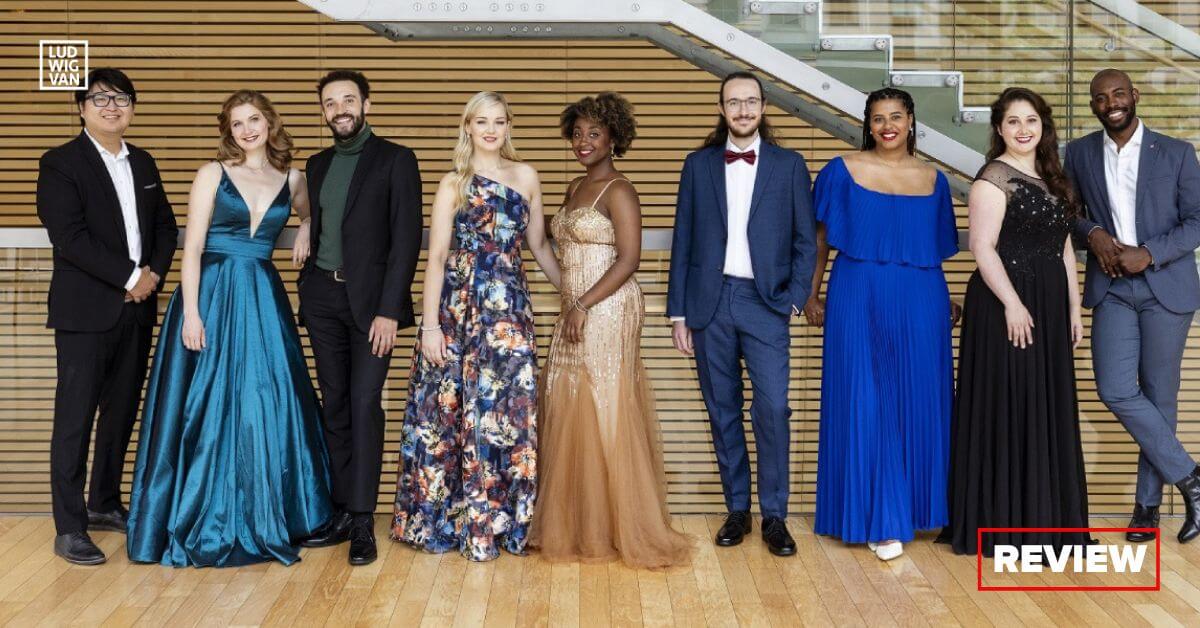
“Svegliatevi nel core” (Giulio Cesare in Egitto) Queen Hezumuryango, sop., Mattia Senesi, piano / “Bella siccome un angelo” (Don Pasquale) Korin Thomas-Smith, bar., Brian Cho, piano / “Wie du varst, wie du bist”(Der Rosenkavalier), Alex Hetherington, mezzo., Brian Cho, piano / “O amore, vieni a me!” (Medea) Ariane Cossette, sop., Mattia Senesi, piano / “Meine Lippen, sie küssen so heiss” (Giuditta) Charlotte Siegel, sop., Mattia Senesi, piano / “Ecco ridente in Cielo” (Il barbiere di Siviglia) Wesley Harrison, ten., Brian Cho, piano / “Je suis Titania” (Mignon) Karoline Podolak sop., Mattia Senesi, piano. Richard Bradshaw Amphitheatre, Four Seasons Centre, September 20, 2023.
September is an exciting time for Toronto opera fans. It marks the start of the new season of the Canadian Opera Company, with a full slate of mainstage productions as well as many enticing concerts in venues big and small. Even before opening night on September 29, opera lovers got a sneak peek at this year’s Ensemble Studio, in a delightful (and free) noon hour concert on Wednesday.
It took place in the Richard Bradshaw Amphitheatre of the Four Seasons Centre, an informal venue where everyone sits rather uncomfortably on glorified stairs with no back support — never mind, the lovely voices made it all worthwhile. As usual, it was very well attended, albeit not quite as packed to the rafters as in the pre-pandemic days, now with fewer standees. That said, the audience was every bit as enthusiastic and for good reason — the 2023-24 Ensemble Studio promises to be a very good year.
Performing were all nine members of the COC Ensemble Studio, seven singers and two collaborative pianists. Each artist began with a brief introduction and a few words about the aria. Of the seven singers, three are in their first year in the Ensemble — soprano Karoline Podolak, tenor Wesley Harrison, and baritone Korin Thomas-Smith. Also new to the Ensemble this year is pianist Mattia Senesi.
Kicking off the proceedings was mezzo Queen Hezumuryango, in Sesto’s aria from Giulio Cesare in Egitto, which she sang with big volume, rich tone, and plenty of temperament. She must be very fond of Handel, as I seem to recall her choice last year was an aria from Semele.
Then it was Korin Thomas-Smith’s turn, singing Malatesta’s “Bella siccome un angelo,” a piece well suited to his engaging lyric baritone with a warm timbre. It’s a voice I am familiar with from his student days in the UofT Faculty of Music.
Mezzo Alex Hetherington followed with “Wie du vast, wie du bist” from Der Rosenkavalier. It’s the first voice of Octavian, first heard when the curtain goes up. Not formally structured as an aria, this soliloquy is rarely excerpted as a set piece, but it is vocally ideal for Hetherington’s high mezzo. I look forward to hearing her as Octavian in the future.
She was followed by Québec soprano Ariane Cossette, in Glauce’s aria from Medea. Cossette’s soprano is a full lyric, with beautifully focused tone and enough volume to be heard in a big house. Hearing her powerful top, I wouldn’t be surprised if in a few years, her voice might well be ideal in the so-called “youthfully dramatic soprano” fach in Wagner and Strauss. I can just imagine Cossette tossing off Helmwige’s top C’s in the Ride of the Valkyries!
Soprano Charlotte Siegel, now in her third year and who will be the mainstage Musetta this season, offered a lively “Meine Lippen” from Giuditta, singing with big volume and theatricality, plus plenty of metal in her top notes. Then it was tenor Wesley Harrison’s turn. The Third Prize winner of last year’s Centre Stage, Harrison’s fine lyric tenor with good agility is well suited to Rossini, here heard to advantage in Count Almaviva’s “Ecco ridente in Cielo” from Il barbiere di Siviglia.
The last aria was sung by Polish Canadian soprano Karoline Podolak. She has the most experience, not to mention the most media attention, of the seven singers, having won last season’s Centre Stage and a long list of competitions elsewhere. She has already sung major roles such as Violetta to great success. Her “Je suis Titania” from Mignon showed in no uncertain terms the reason for her success: a voice of lovely timbre and excellent agility, combined with a beautiful stage presence and the right dramatic instincts.
I mustn’t forget the excellent work of Brian Cho and Mattia Senesi. They are not accompanists but collaborative pianists, offering solid support and contributing to the superlative music-making. With seven arias, the noon-hour concert was on the short side, but enough to whet our appetite. We’ll get to hear them again soon, on November 27 at the RBA, in Brahms’ well-known Liebeslieder Walzer and Canadian composer John Greer’s contemporary take on the same theme.
Not to be missed!
#LUDWIGVAN
Get the daily arts news straight to your inbox.



